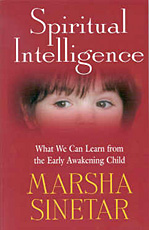"Spiritually intelligent children ponder the mysteries of existence. For that pondering, they covet solitude. Or they'll use privacy to immerse themselves in favorite activities. They read. They draw. They stare at walls. They listen to music, dance, go fishing, or toy endlessly with what some consider mind-numbing computer games. In these fanciful hours, there is learning going on. Play is productive. It's the chief employer of childhood. (One hardly knows what to make of 'cult of efficiency' schools — and Boards of Education — that now have schemes for less recess, or none at all.)
"Critical treasures of intelligence develop during a child's daydreamy processes and make-believe. An enriched inner life, fantasy, the projections of a pretend world prepare youngsters for life. Adults who appropriately encourage the charms of such play encourage children to wholeness. Infancy is not to soon to notice what a baby wants or prefers. And adulthood is not too late to heed what we love, either.
"Play's the thing. Play unlocks talent and frees up thinking. Rather than providing an escape hatch from reality (as some rigid adults view a child's imaginary life), freely chosen, frequently isolated, self-styled amusements develop intelligence. Play draws children out. It lets them know themselves and be real. Play is youth's master teacher. It opens doors to what a child may sense is a preexisting order, as one writer explained:
" 'When I was four, I'd sit at the piano, make up little songs and sing for hours. Or, I'd put on music and with my arms spread to the sky, fly with abandon around the room, totally in private . . . My exuberance was personal, nothing I'd ever seen anyone else do, some way of being I'd always known.
"If you are an aware, creative child, you'll be immersed in such discovery. Play is your 'work.' It's how you explore the tone and terrain of your inmost landscape, your ground of being. Play helps you relate to your world at large and easily consumes all your time."
